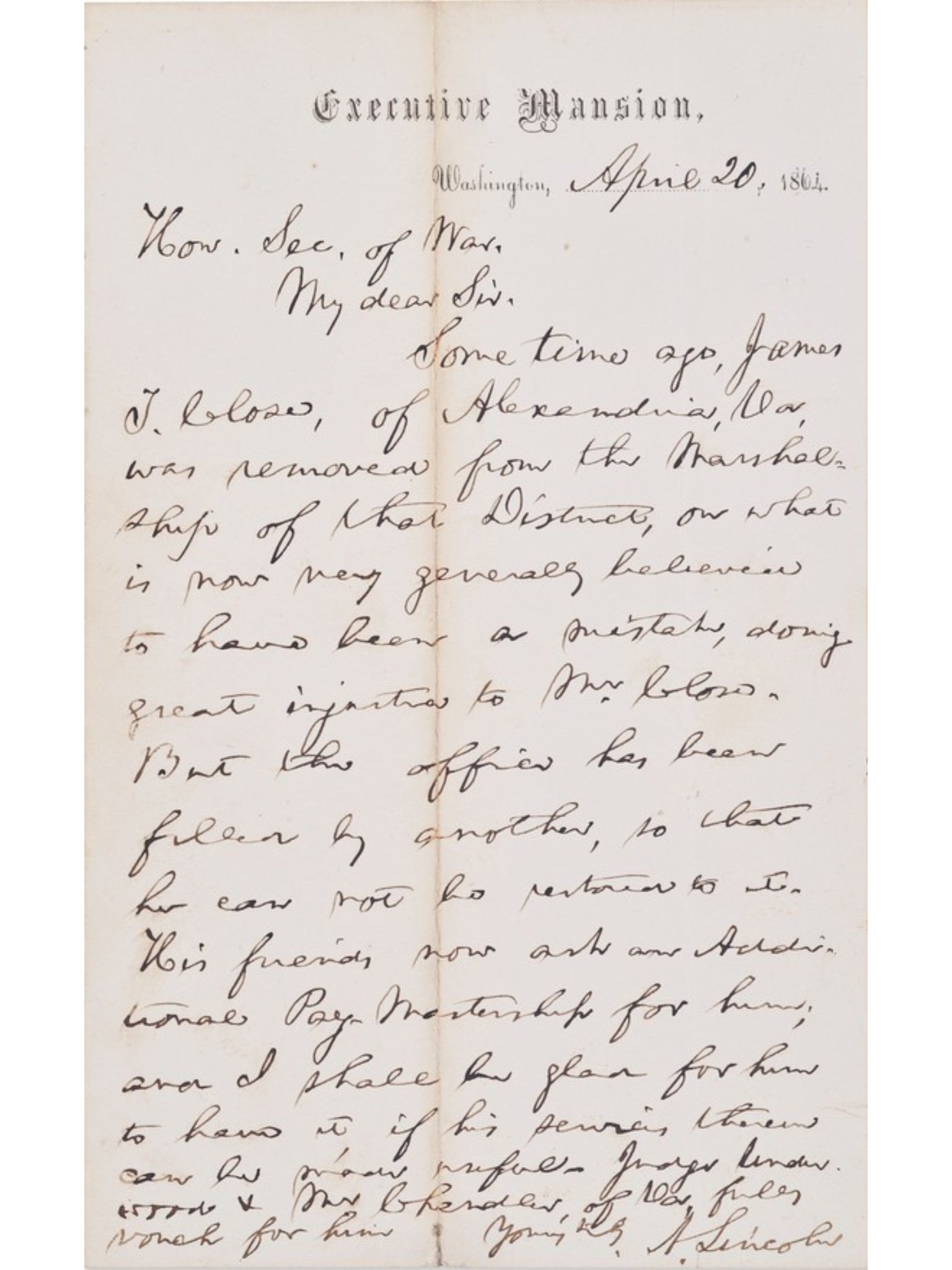 Image 1 of
Image 1 of


Abraham Lincoln 1864 Civil War Dated Autograph Letter Signed as President
16th President. Autograph letter signed “A. Lincoln" as President, to Secretary of War Edwin M. Stanton, Washington, April 20, 1864.
One page of Executive Mansion stationery with a vertical crease and a small tape repair on verso.
Lincoln requests a paymastership for a mistakenly-dismissed marshal of Alexandria, Virginia, James T. Close. He writes:
Some time ago, James T. Close, of Alexandria, Va, was removed from the Marshalship of that District, on what is now very generally believed to have been a mistake, doing great injustice to Mr. Close. But the office has been filled by another, so that he can not be restored to it. His friends now ask an Additional Pay Mastership for him; and I shall be glad for him to have it if his service therein can be made useful – Judge Underwood & Mr Chandler, of Va, fully vouch for him.
James T. Close previously served as Colonel of the 16th Regiment of Virginia Volunteer Infantry, resigning in May 1863 to accept his commission as U.S. Marshal.
Notably also referenced here is John Curtiss Underwood, a staunch abolitionist and early Republican, who was appointed by Lincoln to a seat on the U.S. District Court for the Eastern District of Virginia. Known for his strong condemnation of the Confederacy, it was at Underwood's court in Norfolk where a grand jury indicted Robert E. Lee and other prominent Confederates for treason.
The letter is not published in Basler.
16th President. Autograph letter signed “A. Lincoln" as President, to Secretary of War Edwin M. Stanton, Washington, April 20, 1864.
One page of Executive Mansion stationery with a vertical crease and a small tape repair on verso.
Lincoln requests a paymastership for a mistakenly-dismissed marshal of Alexandria, Virginia, James T. Close. He writes:
Some time ago, James T. Close, of Alexandria, Va, was removed from the Marshalship of that District, on what is now very generally believed to have been a mistake, doing great injustice to Mr. Close. But the office has been filled by another, so that he can not be restored to it. His friends now ask an Additional Pay Mastership for him; and I shall be glad for him to have it if his service therein can be made useful – Judge Underwood & Mr Chandler, of Va, fully vouch for him.
James T. Close previously served as Colonel of the 16th Regiment of Virginia Volunteer Infantry, resigning in May 1863 to accept his commission as U.S. Marshal.
Notably also referenced here is John Curtiss Underwood, a staunch abolitionist and early Republican, who was appointed by Lincoln to a seat on the U.S. District Court for the Eastern District of Virginia. Known for his strong condemnation of the Confederacy, it was at Underwood's court in Norfolk where a grand jury indicted Robert E. Lee and other prominent Confederates for treason.
The letter is not published in Basler.
16th President. Autograph letter signed “A. Lincoln" as President, to Secretary of War Edwin M. Stanton, Washington, April 20, 1864.
One page of Executive Mansion stationery with a vertical crease and a small tape repair on verso.
Lincoln requests a paymastership for a mistakenly-dismissed marshal of Alexandria, Virginia, James T. Close. He writes:
Some time ago, James T. Close, of Alexandria, Va, was removed from the Marshalship of that District, on what is now very generally believed to have been a mistake, doing great injustice to Mr. Close. But the office has been filled by another, so that he can not be restored to it. His friends now ask an Additional Pay Mastership for him; and I shall be glad for him to have it if his service therein can be made useful – Judge Underwood & Mr Chandler, of Va, fully vouch for him.
James T. Close previously served as Colonel of the 16th Regiment of Virginia Volunteer Infantry, resigning in May 1863 to accept his commission as U.S. Marshal.
Notably also referenced here is John Curtiss Underwood, a staunch abolitionist and early Republican, who was appointed by Lincoln to a seat on the U.S. District Court for the Eastern District of Virginia. Known for his strong condemnation of the Confederacy, it was at Underwood's court in Norfolk where a grand jury indicted Robert E. Lee and other prominent Confederates for treason.
The letter is not published in Basler.
